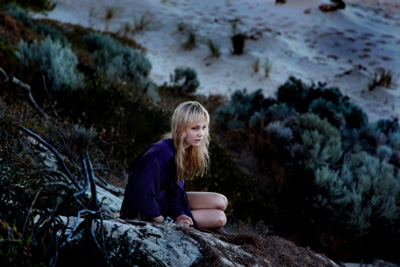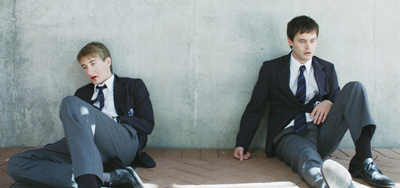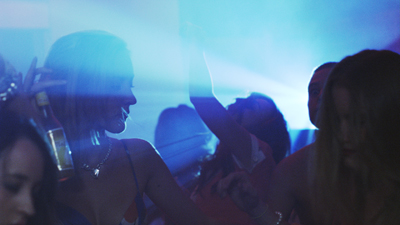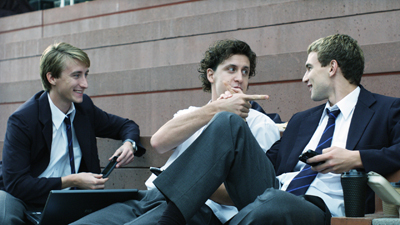Wasted On The Young Interview

Wasted On The Young
Cast: Oliver Ackland, Adelaide Clemens, TJ Power, Alex Russell, Georgina HaigDirector: Ben C. Lucas
Genre: Drama
Running Time: 97 minutes
Synopsis: Set in a privileged new money high school Wasted On The Young begins, innocently enough, after a swimming heat. Captain of the team is Zack. He wins the heat but all he really cares about is the party he's throwing that same night. On the way home, however, he puts pressure on his new step brother - Darren - to do his homework. He tells Darren he's actually doing him a favour - like the mobster boss making an offer that can't be refused Zack reasons that if Darren does him this solid his life might get a little easier. That's how the world runs here: according to Zack.
So party night arrives and Darren secludes himself in his room to play computer games online with his friends. Darren is an internal boy, his room an eclectic mix of gizmos and hacked down computer hardware.
Meanwhile downstairs the house is being torn apart by the feeding frenzy of an unleashed hormone driven crowd. At the centre of it all is, of course, Zack. Life isn't hard for this boy. So when there are no boundaries there are no limits and Zack takes full advantage of his power to get what he wants when he wants it. And he wants one girl: Xandrie.
Who is she? A flashback to the week before the party unveils the merging paths of Xandrie, Zack and Darren.
Xandrie's best friend was being stalked by one of the swimming team jocks. That is until the obscene pictures he was texting to the poor girl are posted online for the rest of the student body to ridicule. Xandrie does develops a suspicion for who the vigilante might be... her eyes move to Darren sitting alone in the corner of the library with his laptop.
She approaches him openly - she makes it clear she likes him. She urges him to make an appearance at the party. She'll be there if he will. She gives him her number and leaves the glass slipper of 'text me'.
Zack observes this happening. Perhaps out of a dislike for Darren, perhaps because nothing happens in his school unless he authorizes it or maybe because he has genuine feelings for Xandrie he finds himself lost in the idea of Xandrie. Sitting in his usual lunch spot with his friends around him he has to be dragged from his reverie and into their conversation.
However at the party Zack makes his move on Xandrie and is bluntly put down. This doesn't sit will with him. And knowing that she is rejecting him in favour of Darren is the final twist of the knife.
Meanwhile two of Zack's friends are discussing his lovelife. One of them has had a crush on him for as long as she can remember and so she laments that Zack is trying to 'get with' Xandrie. But there is a solution: they dose a drink with ketamine, then seduce Xandrie into 'having fun for once' and watch her drink the poison cup. They have no idea what they have done. When Darren finds her it's too late� his would be girlfriend appears to have been absorbed into that popular group he hates so much. He goes to bed angry and turns off his phone.
But what was meant to be a joke turns ugly. Later in the night Zack exercises his desire with the unconscious Xandrie. Then with the help of his closest cronies dumps her motionless body on a nearby beach.
Darren begins a spiraling journey to find out what happened that night. It starts when he tries to call Xandrie and finds her phone amongst the debris of the party from the night before. It continues when she doesn't appear at school. Then the gossip begins - cruel and bitter rumours about how Zack turned her down, she got drunk and then changed schools in shame.
 Xandrie's friends don't know where she is, Zack is chillingly dismissive about what happened. Darren, however, continues to dig - he beats up a boy for answers, he hacks school records, he checks surveillance cameras� all in an effort to cut through the bullshit gossip and find out what really happened to Xandrie.
Xandrie's friends don't know where she is, Zack is chillingly dismissive about what happened. Darren, however, continues to dig - he beats up a boy for answers, he hacks school records, he checks surveillance cameras� all in an effort to cut through the bullshit gossip and find out what really happened to Xandrie. What nobody expects is for Xandrie to suddenly come back to school and wash away all the conjecture. Albeit she is clearly wearing a façade of strength as if through willpower alone she can wash away all the terrors she has been through. Drugged, raped, abandoned. What was once a positive and lively spirit is now a girl made of stone. Her very appearance, however, starts to loosen the screws on the perfect world Zack has built around himself.
He tries to maintain normalcy with the continual catch-cry of 'nothing happened.' For the most part he is in the clear - his reputation alone puts him beyond reproach and the gossip is so blindly against Xandrie that it starts to take on it's own twisted truth. The people speak and they speak in Zack's favor because he wins medals for the school and throws great parties. In fact one of his solutions is to throw another, bigger party to get morale back on his side.
What Zack can't control, however, is Darren. Darren has seen the girl he loves transformed and he keeps pushing until he finally learns what happened to her. When he does he wishes he didn't� what can anyone do to mend a situation so dire? The simple answer is nothing and frustration at the overwhelming injustice twists Darren until he begins to fantasize about getting a gun and blowing everyone away.
Too little too late. Xandrie has the same idea except she follows through. In the events that culminate three destines are changed forever. The outcome is not based on brutality or simple revenge: the outcome is thrown to the masses. Who lives? Who dies? Who deserves justice?
In this world without adults the school rules and so the students are the ones to pass judgement in the court that Darren sets up for Zack at his next, and final, party.
Release Date: 3rd March, 2011
Website: www.facebook.com/WastedOnTheYoung
From Idea to Screen
In 2006, Aidan O'Bryan had an idea for a low budget film. The premise included two brothers, something horrible happening to a girl at a party and then one of the brothers avenging her at another party in the same house. The goal was to use a non-linear narrative and a cast of exciting young actors to make the most of a film contained in one location.
Writer-Director Ben C. Lucas had been working with Janelle Landers on a short film and was approached by Aidan and Janelle to write the first draft of a screenplay. Intrigued by the idea and the storytelling possibilities, as well as the likelihood of the producers attracting funding for the film, Ben C. Lucas accepted. The deadline approached for ScreenWest's West Coast Visions fund and the team used that date as the goal for the first draft and for developing the production model.
To some surprise among the filmmakers, the application was successful and they were faced with the prospect of a greenlit film. The next year was spent completing other projects and Ben C. Lucas working with the producers to re-draft the script. Aidan O'Bryan - "Where Ben C. Lucas took the story is far grander and more satisfying than my idea, which was essentially for a cool take on a slasher film with a high tech edge. Expanding the story and establishing the world of the school society adds an important layer and turned my idea into a film that we could all be really excited about working on."
The remaining finance for the film was sought in a way that guaranteed the independence of the production and ensured that the filmmakers would have complete creative control. "Even though it was a debut feature for all of us, we were confident that we would bring a film to the screen that would be better than most people expected of us so we thought we'd be in a much better position to attach a distributor to the film once it was finished." - Janelle Landers
A major component of the film, even from the earliest idea stage, was the digital world. Texting and social networking are ubiquitous in the lives of young people and so were a very deliberate element in the script, and ultimately major considerations for the shoot and the edit. The roles played by text messages, websites, cell phones and surveillance cameras allow the characters and the audience a privileged insight into the full goings on of the story and offer creative opportunities in the storytelling.
There was an expectation that the film, with its depiction of violent, hedonistic teenagers fuelled by drugs and alcohol and impervious to the influence of adults, would attract controversy. The film was realised to explore the potential outcomes of a potent combination of real world factors: the fact that young people today have less adult influence in their lives; increasingly available, potentially anonymous technological tools; and the under-developed moral and ethical framework that exists in young people as they mature through their teenage lives with a mix of exploration and risk-taking behaviour. Though these are real world situations, the film was always envisaged as a morality tale, a parable about justice, and the team very particularly chose to make a film that was hyper-real. By doing so creating a film where the underlying themes have even more impact than the action and the story is told in a context that constantly suggests 'this is not your world, but this is very like your world'.
 Ben C. Lucas's approach as a writer flowed into his work as a director, creating a very distinctive style and a rich and complete society and environment for the film. Ben C. Lucas noted "�we're kind of peering in on their universe, that it's something that exists apart from us and we have to kind of dig into it to figure out what is going on. � It's about creating an atmosphere where the audience is made to play catch up and always looking around corners and trying to figure the story out for themselves without having it presented fully lit full frame."
Ben C. Lucas's approach as a writer flowed into his work as a director, creating a very distinctive style and a rich and complete society and environment for the film. Ben C. Lucas noted "�we're kind of peering in on their universe, that it's something that exists apart from us and we have to kind of dig into it to figure out what is going on. � It's about creating an atmosphere where the audience is made to play catch up and always looking around corners and trying to figure the story out for themselves without having it presented fully lit full frame." Casting
Casting was the first and most important building block for the film making team. The producers looked at the Australian films they liked and the same casting agent's name kept turning up: Greg Apps. "The guy who put Russell Crowe into Proof and Romper Stomper and put Eric Bana into Chopper, he was at the top of our list", Janelle Landers says, "so we started there and to our surprise he accepted".
The team cast their net far and wide looking for unknown actors with the ability to bring real life, authenticity and presence to the characters, holding auditions in Brisbane, Sydney, Melbourne and Perth and looking at screen tests from as far afield as New Zealand, Canada and the US. The most important thing to get right was the ensemble as a whole so actors were not cast in isolation but were tested and re-tested in different combinations to find the best fit. A number of the key cast came from the Western Australian Academy of Performing Arts which counts Hugh Jackman among its alumni. Open workshops in Perth provided a great pool of young actors to draw on for the minor roles and even turned up a key cast member. "To have such a huge ensemble cast and to get every part as right as we have is just extraordinary" says Ben C. Lucas, "it's the heart and soul of it, they're the reason why we are watching the film".
Ben C. Lucas worked closely with the actors throughout a three week intensive rehearsal period before pre-production commenced, taking on their feedback and benefitting from the way they chose to inhabit and develop their roles. "As a director, you've got all the characters to think about, as well as everything else, but the actors spend all their time just thinking about their own character so they can come up with some really good ideas" he says.
Oliver Ackland as Darren
Oliver Ackland straight away responded to the character when he read the script, even from an early draft, relishing the opportunity to see an outsider take on the popular kids. "I didn't want to make him an out and out nerd, he's pretty introspective and a loner by choice. He's chosen to remove himself and he had chosen to exist in his own little bubble". Oliver was encouraged by Ben C. Lucas to think of Darren as a modern, reclusive Renaissance man and Oliver found connections for Darren in iconic figures like Nick Cave and Kurt Cobain.
Adelaide Clemens as Xandrie
"I think she's pretty amazing, she goes this was something that happened to me and there's no way I invited it, there's no way I deserved it, I'm not going to let it beat me�". Adelaide Clemens spent a lot of time trying to understand Xandries' journey from a happy, confident girl, then going through a personal hell and ultimately seeking revenge. She spent time with counselors talking about the experiences of assault and drugs and drew great inspiration from a book of literary suicides when trying to understand Xandrie's ultimate decision.
Alex Russell as Zack
"I was like Shay at school, Zack was the guy who picked on me so I think I really liked the idea of playing the bully" - Alex Russell. Alex Russell is well known as an incredibly lovely and friendly guy so the role of Zack wasn't as easy to inhabit as he'd hoped: "It was a big challenge to understand where he was coming from. The breakthrough came when Ben C. Lucas told me was he's the life of the party, that he's a happy guy who just wants to have fun. Ben C. Lucas said 'You have to think of him as the hero in this film. He's not the villain.' and suddenly I understood him."
The Shoot
It was important to the team that everything possible be done to make sure that the film didn't feel like a low budget film. Every detail of the film was meticulously planned to maximise the cinematic experience and to make sure that the film could stand alongside far better resourced productions. Aidan O'Bryan - "The film has to look as good as anything anyone has a chance to see in the cinema otherwise why would they go and see it?".
The filmmakers did extensive testing of different digital formats before deciding to shoot on HDCamSR using the Panavision Genesis. Ben C. Lucas had worked as a First AD on a film with Cinematographer Dan Freene and they jumped at the chance to work together again. "Ben C. Lucas has an amazing way of looking at the world and a real understanding of all the elements of filmmaking so, as a DoP, he's a real exciting guy to work with." - Dan Freene.
Pre-production was an intensive period as more crew members came on board and the producers did everything they could to give Ben C. Lucas and his team the best opportunity to make the film as he saw it. Close collaborations with production designer Sam Hobbs, Dan Freene and First Assistant Director Brendan Campbell brought Ben C. Lucas's vision to life.
 Ben C. Lucas's visual aesthetic was always focused on advancing and adding to the story and creating the feeling of a distinct and consistent world within the film. Ben C. Lucas says "Our lighting aesthetic is based on blues and high contrast, it's quite dark and moody" and Dan Freene adds "It's a dark story and it needs to be handled that way".
Ben C. Lucas's visual aesthetic was always focused on advancing and adding to the story and creating the feeling of a distinct and consistent world within the film. Ben C. Lucas says "Our lighting aesthetic is based on blues and high contrast, it's quite dark and moody" and Dan Freene adds "It's a dark story and it needs to be handled that way". The rest of the crew came together from a depleted pool as a number of Western Australian productions were shooting at the same time but the filmmakers were extremely happy with the key crew and everyone quickly got together to achieve Ben C. Lucas's clear vision. "Once the crew got together on set � everyone realised that we were striving very high and perhaps higher than they were used to. I think that a lot of people on the crew started our shoot thinking that we were just another film but by the end of it I'm entirely sure that the vast majority of people were really united about something that they really believed in" - Aidan O'Bryan.
MORE
- Mission: Impossible Fallout
- Glenn Close The Wife
- Allison Chhorn Stanley's Mouth Interview
- Benicio Del Toro Sicario: Day of the Soldado
- Dame Judi Dench Tea With The Dames
- Sandra Bullock Ocean's 8
- Chris Pratt Jurassic World: Fallen Kingdom
- Claudia Sangiorgi Dalimore and Michelle Grace...
- Rachel McAdams Disobedience Interview
- Sebastián Lelio and Alessandro Nivola...
- Perri Cummings Trench Interview



